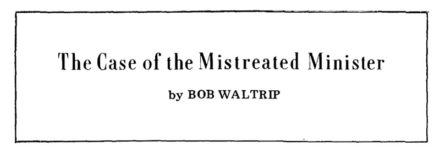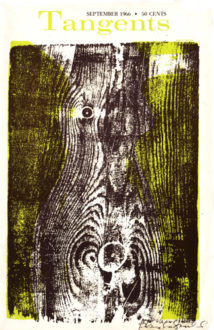The Case of the Mistreated Minister
by Bob Waltrip
September 1966 • Vol. 1 No. 12
Originally published in the September 1966 issue of Tangents
pp. 4–7
 Keith Milton Rinehart is the thirty-year-old leader of Seattle’s “Aquarian Foundation”[1]The original article spelled this as “Acquarian” throughout. which is a church organization that studies not only various religions but also various types of psychic phenomena. The Aquarian Foundation has for years loudly stressed that homosexuals are welcomed into its midst- valuable members—and the foundation emphasizes that homosexuality, in its eyes, is not a horrible disease but rather a valid means of emotional expression for some people.
Keith Milton Rinehart is the thirty-year-old leader of Seattle’s “Aquarian Foundation”[1]The original article spelled this as “Acquarian” throughout. which is a church organization that studies not only various religions but also various types of psychic phenomena. The Aquarian Foundation has for years loudly stressed that homosexuals are welcomed into its midst- valuable members—and the foundation emphasizes that homosexuality, in its eyes, is not a horrible disease but rather a valid means of emotional expression for some people.
On Tuesday, April 6, 1965, the Aquarian Foundation telecast a discussion over Seattle’s local channel 13 with Mr. Rinehart as its moderator. The guests on the program included Mrs. Aldous Huxley, a foreign movie star, and an Egyptian scientist. At the end of the discussion an ex-convict, a lesbian, a homosexual, an unwed mother and an interracially married couple were each given a brief opportunity to voice their views. Shortly after the program was aired, Channel 13 bosses cancelled the Foundation’s contract, which called for the showing of the rest of the series, many of the programs of which had already been filmed at considerable expense.
On December 6, 1965, the honorable Howard J. Thompson, presiding judge of the Superior Court of the State of Washington, sentenced Mr. Rinehart to ten years in prison for performing “one count of oral sodomy” on James Miller, a sixteen-year-old hustler and juvenile home parolee.
AN IMPORTANT POINT
According to Washington law, anyone over the age of fifteen is considered sexually adult. So the fact that the boy was a minor didn’t enter into the decision.
AN IMPORTANT QUESTION
Why would Seattle officials single out Keith Milton Rinehart and arrest and convict him under a little-used, outmoded and probably unconstitutional law? After all, the whole case amounted to nothing more than an alleged business transaction between Rinehart and a self- admitted and acknowledged prostitute. According to Rinehart and his attorneys, if the Seattle cops wanted to arrest anyone on sodomy charges they only had to go into one of the city’s several flourishing gay bars, where acts of fellatio abound right under the eyes of policemen hired to keep order in the establishments. The defense, unfortunately and misguidedly, gathered reams of notarized statements to the effect that under the conditions, Rinehart was not afforded “equal protection under the law” and was “arbitrarily selected for arrest.”
Why did Seattle authorities want Rinehart jailed? Certainly the Aquarian Foundation itself presents no great affront lo the public. A look al its literature and its character shows it to be an organization of harmless crackpots and religious fanatics (all of whom, by the way, have rallied strongly and admirably to Rinehart’s defense). A look at Rinehart himself reveals a dominant metaphysical “faith healer” in longhair and beard, loudly and constantly espousing his teachings and beliefs. But this sort of person abounds in every major city in the country. Seemingly, the only explanation for his arrest and conviction is that in following this course the Seattle establishment was adhering to the old American custom of shutting up anyone who deviates.
THE FACTS
On Sunday morning, April 11, 1965, the young hustler—Jim Miller—was arrested, along with two of his friends, on a car prowling charge. At the time of his detention he did not mention knowing Rinehart. The next day, Monday, he was acquitted of the car prowling charge—but in the meantime one of the other boys told the police that Rinehart had picked Miller up after midnight on that same Sunday morning on which they were arrested. Although the judge had let him off on the car prowling charges on Monday, for some unexplained reason Miller was still in jail on Tuesday, and the police questioned him about his association with Rinehart. Then they rummaged around and found their file on Rinehart, which included information about a misdemeanor he had committed as a teenager and an advertisement for the Aquarian Foundation’s television show which bore Rinehart’s photograph.
Miller identified Rinehart from the photo. The policemen then drove the boy to Rinehart’s home, which he also identified. They returned to the station and the boy signed a statement that Rinehart had picked him up Sunday morning, taken him to his home, blown him, given him $15 and his telephone number, then returned him to his friends. After Miller had signed the statement which the cops had written for him (he could not read or write but could copy the writing of others and sign his name) they released him.
That same day Rinehart was arrested at his home. The arresting officers searched his home and confiscated several pieces of what they termed “Pornography” including homosexual material. But they carefully overlooked all of Rinehart’s serious studies on sex and morality.
Rinehart denied any sexual knowledge of the boy. According to him he picked Miller up accidentally. He claimed he was driving along the street and thought he recognized the boy as one of his parishioners and wondered why he was out so late. He stopped his car and honked, and Miller came over. Rinehart saw his mistake, but the boy asked if he could “ride around” with him. Rinehart drove the boy around town, and Miller revealed he was a hustler by trade—detailing his price list for services performed (or received). Rinehart said he was not homosexual, but that he had homosexual friends who often confided their problems to him. He gave Miller his telephone number in case he should ever want counseling and then returned him to his friends.
A few days after Rinehart’s arrest, Mrs. Zady Lemmon, an Aquarian Foundation member, went to the Miller boy’s home to talk. During the conversation he confessed that Rinehart had not had sex with him; that the cops had put pressure on him (by implying that they would get him into trouble with his parole board regarding the car prowling incident) and asked him to implicate Rinehart on the oral sodomy charge because he was an “atheist, a quack, and had put on a goofed-up TV show in town. The (sic) said he had a homosexual on his TV show program.” Miller further said the cops had stated they were “really out to get Rinehart and they needed a statement from me to help them.” Miller signed the statement lo this effect in the presence of Rinehart’s lawyer.
Rinehart appeared for trial on June 10, 1965. The boy didn’t show up and had to be hunted down and brought to court by the police. After being taken into custody he signed another statement saying Rinehart had blown him for money, and that he had signed the statement he had given Mrs. Lemmon and Rinehart’s lawyer because he hoped Mrs. Lemmon would give him some money.

DURING THE TRIAL
Miller told his side of the story; Rinehart told his side of the story. Both the arresting officers and Miller said that Rinehart had pornography and nudist publications in his house (thus implying, of course, that Rinehart was some sort of a bad guy). The judge admitted all sorts of irrelevant and prejudicial evidence against the accused and the jury took no time in finding him guilty. The judge sentenced him to ten years in prison.
Mr. Malcolm L. Edwards, Rinehart’s attorney (a man of boundless courage and intelligence), who became interested [in] the case on appeal, is now asking for the Supreme Court of the State of Washington to declare a mistrial—on the grounds that (1) the court permitted the prejudicial pornography testimony, which automatically branded Rinehart as some kind of sexual freak in the eyes of the jury—while actually, according to Mr. Edwards, the possession of pornography is so common these days as to say nothing about a man’s sexual proclivities, and that such evidence should have no bearing on the case; (2) the court did not allow Rinehart to tell the jury that the police had been in the habit of harrassing [sic] him for some time prior to his arrest; (3) the court did allow the admission of Miller’s first statement—made, contends Mr. Edwards, at a time when the boy had a lot to gain by lying; (4) the prosecuting attorney whitewashed Miller before the jury; (5) the sodomy statute was being applied to Rinehart in particular and not being used against the rest of Seattle’s homosexuals who were allegedly openly flagrant in their violation of the law in this regard, thus depriving Rinehart of “equal protection”; and (6) that the sodomy laws of Washington are unconstitutional because they are inspecific and vaguely worded, and because they attempt to make acts illegal or criminal which are deemed improper or sinful by the majority of religious opinon in America.
Mr. Edwards also feels that the sodomy statues invade the privacy and integrity of the individual, and that a sex act in itself has no relation to other members of society and does not justify regulation by the police power of the state.
The defense in the Rinehart case has indeed raised clear and reasonable questions concerning a man’s liberty and personal conduct deemed immoral by members of society. But will the Supreme Court of Washington be as intelligent and unprejudiced regarding homosexuality and sexual rights generally as Rinehart’s lawyer has proven to be?
Most people will agree, in view of the above arguments, that Rinehart was not given a fair trial. He undoubtedly brought a lot of his troubles on himself. And his willingness to incriminate Seattle’s homosexual population in order to save his own skin is odious. But aside from these considerations, Rinehart’s conviction and sentence painfully shows that even with today’s enlightened sexual attitudes the homosexual is yet the troll under society’s bridge. All the in- formation about the case points to the fact that Seattle’s establishment found Rinehart’s presence embarrassing to them, and they wanted to get rid of him because he was a weird person. Since Mrs. Grundy considers the wierdest [sic] person to be the homosexual person, Seattle bosses had to nail Rinehart with the sodomy charge in order to be really sure of stomping him out.
This reporter sees weird and even unpleasant people almost every day. They proliferate and abound in the L.A. area. Do I like them? No. Do I associate with them? No. But as long as they present no physical threat to me or anyone else, I want them to be left alone and allowed to be as boorish and unpleasant as they please.
©1966, 2018 by The Tangent Group. All rights reserved.

